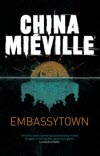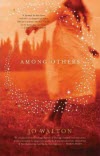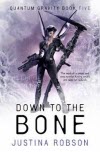Contenders
Cheryl Morgan looks at two books that are being tipped as future award winners.
When you have a very limited number of books you can review each month there are always interesting questions as to which ones you should choose. Most readers, one might expect, would want to hear more about the books that everyone is talking about. What is my take on the latest hot property? That’s certainly an interesting challenge, though it does cut me off from reading other people’s work until I have completed my own. I find that reading other people’s reviews of a book fills my head with all sorts of ideas that may not have got there from reading the book alone. After I have written this column I can go and find out whether my impressions of these books match what others have said.
The alternative approach is a more missionary one: reviewing books that people might not otherwise have heard of, had you not given them column space. Personally I am very attracted to that idea. The world is full of good books, and many of them will sell in vast quantities regardless of what I say about them. Others could do with a helping hand. In this column over the months I have tried to mix things up, giving you a selection of interesting lesser-known books seasoned with expected best sellers. This month, however, I have ended up reading two books that are being hotly tipped for glory. And the one golden rule of a review column is that you can only review what you have read. So this is what you are going to get.

At this point in his career, any new novel from China Miéville is going to be tipped for awards, though I note that Kraken did not get on the Clarke Award short list, and I’m going to stick my neck out and say that I don’t think it will make the Hugo ballot either. The book is a fun read, and you can’t really go wrong with a squid god. But it is fun because it is often very silly, and very silly is not what people think of first when they are trying to be serious about awards. Knowing China, I am sure that there are some very serious points being made in the book, but I may have to read it again to find them. I am easily distracted by tentacles.

Embassytown [Purchase] is a rather different kettle of calamari. It is, for a start, unabashed science fiction. It is strange to think of it as being Miéville’s first “science fiction novel” when he has already won the Arthur C. Clarke Award an unprecedented three times. However, Perdido Street Station and Iron Council are very obviously fantasy-tinged, and The City and The City is a noir detective story. Embassytown, in contrast, is set on an alien planet and has space travel in it. The book must be science fiction, mustn’t it?
Well that all depends. I’m not going to get into a discussion of the nature of science fiction, but I will note that the majority of the actual science in Embassytown is hand-waving based on existing tropes. The “immer” through which ships travel is simply another name for hyperspace. The AIs and clones are standard features of dozens of other novels. The thing that is interesting about Embassytown — the bit where it gets serious — revolves around not physics or chemistry, or even the odd biology of the aliens, but around linguistics. Let me explain.
Embassytown (the place, not the book) is so called because, rather obviously, its central feature is an embassy. The native intelligent species of the planet Arieka is notable primarily for the extreme difficulty that humans have in communicating with them. There are two main problems. The first is that the Ariekei have two mouths, and speak with both at once. This probably caused almost as much heartache for Miéville’s typesetters as it did for the first humans to visit Arieka. Goodness only knows how they will manage to reproduce Ariekene speech in an ebook with the current limited formatting options. The real problem, however, is that the Ariekei appear to only recognize meaning in words if they are spoken by a conscious being that is investing them with meaning.
Wait, what? Yes, it is a complicated concept, but it is one you need to get your head around in reading Embassytown, because it is absolutely central to the plot. The Ariekei don’t recognize ordinary humans as intelligent. The only people they will speak to are the Ambassadors — pairs of people trained to speak in unison as if they were a single being. Even then there are many things that the Ariekei can’t understand because they are too abstract. They don’t process symbols and signifiers well. If they have to deal with a complex, abstract idea, they prefer to use similes — something real that they have seen and can talk about.
Our heroine, Avice Benner Cho, was a simile in her youth. She got to be “the girl who ate what was given to her”, which is not the title of an Ariekene version of a Stieg Larsson novel, but rather is a complex idea that Forrest Gump might have simplified by pointing out that once you have your box of chocolates you just have to eat the ones you find in it. Within this, however, Ariekene philosophers find plenty or room for argument.
In the main my simile was used to describe a kind of making do. Spanish Dancer and its friends, though, by some odd rhetoric, by emphasis on a certain syllable, spoke me rather to imply potential change. That was the kind of panache that could get Hosts ecstatic.
The term Hosts is how the people of Embassytown refer to their alien neighbors. They understand that they are mere visitors to Arieka, and could be required to leave at any time. “Spanish Dancer” is a name given by Avice to one of the Ariekei because its coloring and shape suggests the dress of a flamenco dancer.
I’m no expert in linguistics, or in semiotics for that matter. I’m looking forward to hearing what people who have more knowledge of the ideas that Mi‚ville is playing with make of this book. In the absence of that knowledge I have to accept his assertion that this strange characteristic of the Ariekei is plausible science. Or at least I do if the linguistics content isn’t yet more background hand waving. Bear with me.
It gets more complicated too. Because they can only understand language that relates to something they have actually experienced, the Ariekei have a disturbing tendency to believe what they are told. The whole idea of lying is foreign to them. How can one lie if one can only talk about things one can point at? Some Ariekei, like Spanish Dancer, find the idea of trying to lie to be a wonderful intellectual game; but others, including some of the humans, regard the potential corruption of Ariekene innocence with horror.
There are clear references to colonialism here: the corruption of the noble savage by the introduction of decadent ideas, of disease, or simply alcohol, are all well-known narratives. And fairly obviously the book is asking us to think about something. At one point towards the end of the book Avice says, “I don’t want to be a simile any more […] I want to be a metaphor.” It would astonish me if a book that talks so much about the power of ideas did not have a few that it wanted to impart to the reader. The question that leaves us is, what ideas does Miéville want us to take away? And there’s an obvious supplementary of: are those ideas dependent on the scientific plausibility of the nature of Ariekene language?
Naturally you don’t want spoilers. Then again, it is entirely likely that my reading of the book will be wildly different from anyone else’s so if I do pontificate that may not spoil anything. Unlike the Ariekei, I could be lying. Or I could just have seen a different meaning in the simile to the one that you will see. Whatever. I’m not going to say anything much about the plot and how it pans out, and you are always free to look away now.
Still with me? Good. Here’s the thing. The problem with the Ariekei is that they are much too willing to believe what they are told. They think that what the humans tell them must be true. And the only way that Avice can save them from themselves is to quite literally raise their consciousness. If that’s the case then I suspect we are not really talking about colonialism, we are talking about people being spoon-fed lies; and the Ariekei are not noble savages, they are us.


If you want to win a Hugo Award, one of the obvious things to do is to write a book that appeals directly to the relevant demographic. I don’t for a moment suggest that is what Jo Walton had in mind when she came up with the idea for Among Others [Purchase]. It is very clear from the acknowledgements, from the Welsh background, and from the fact that the viewpoint character, Mori, walks with a cane, that the book is in part autobiographical. Mining your own life for ideas is something that writers have been doing for centuries, so we can’t complain about Walton doing it. Nevertheless, the basic theme of the book — that of a socially awkward child finding solace in science fiction books, and eventually a family in fandom — is one that will resonate deeply with many Worldcon regulars. Several people have already been talking enthusiastically about the book.
On the other hand, there are few things more effective at destroying one’s suspension of disbelief in a book than having it be about a subject that you are an expert on. Whatever knowledge the writer has, it will probably only scratch the surface of what you know, and the book is likely to be full of simplifications and errors that will make you wince. Walton, of course, knows her science fiction very well (though there is an inexplicable, large, Moorcock-shaped hole in the book) so she’s not going to trip over there. Among Others is full of admiration for the likes of Heinlein, Delany, Zelazny, Le Guin, Tiptree and many others. It also has passages like this:
Libraries really are wonderful. They’re better than bookshops, even. I mean bookshops make a profit on selling you books, but libraries just sit there lending you books quietly out of the goodness of their hearts.
Given the timescales on which publishing works, Walton must have written those words long before the current UK government began its insane war on libraries, but they have turned out to be very timely.
So members of the science fiction community, especially those who grew up on the same books that Mori reads, are going to very attracted to this book, but what about the other aspects of it? The story is set in a few months at the end of 1979 and beginning of 1980. I was actually in university then, but Mori isn’t that much younger than me, and we both grew up in the UK. How does Among Others stack up for me?
I should start by saying that the book provides an excellent portrait of how awful family life could be at that time. There was so much that was just not talked about. And there are few things more horrible than having upper-middle class relatives when you are quite poor yourself. Despite the presence of a number of fairies in the narrative, the clear depiction of family life gives the book the air of a typical mainstream domestic drama. I never went to a boarding school, but I’m pretty sure that the school life is very well done too.
Mori, on the other hand, while a beautifully drawn character, at times doesn’t feel much like a teenage girl. Perhaps it is inevitable given her difficult upbringing, but she seems awfully self-confident at times. At one point in the book, after a difficult Christmas game of Monopoly with her horrible maiden aunts she remarks, “There were times in that game when they were squabbling with each other when I felt as if I was the oldest person at the table.” There are times when I thought Mori was the oldest person in the book.
What really got me though, was the absence of music. Remember, this is a story set in a school for teenage girls. And yet, aside from a brief mention of the Sex Pistols, we don’t get any information about music until around page 200 when Mori goes to a party and we hear of The Clash and Elvis Costello. Mori doesn’t like Costello; she prefers Bob Dylan, though she doesn’t seem to know that he’s just become a Born Again Christian.
I don’t understand. How can one write a story about an unhappy school life in 1979 and not mention The Boomtown Rats “I Don’t’ Like Mondays”? Why are the girls not arguing over whether Gary Numan’s make-up makes him look cute or sissy? Why are they not swooning over Sting and trying to look like Debbie Harry?
For that matter, why does no one play Dungeons & Dragons?
Of course they quite likely are doing such things, but Mori doesn’t notice them, and as the book is a first-person narrative we don’t get told about them. Mori is too grown up for pop music, and as long as Walton’s readers are also too grown up for such things they won’t mind. They’ll be far more interested in things like this:
“What’s a Worldcon?”
“A world science fiction convention. It’s five days where people get together and talk about SF. Last year it was in Brighton and I went. It was beyond brill. You can’t imagine.”
Well, we can, of course. Many of us will remember that first thrill of discovery of community. The book will connect very well with a particular audience. But a book’s success or failure can turn on very small matters, and to me it seemed to be set in a strange, parallel universe where all the things that were important to me as a teenager didn’t exist. In 1979 I was madly in love with Bruce Springsteen and read books mainly to get ideas for my role-playing campaign. Things haven’t changed that much in the intervening years. Mori probably thinks that I need to grow up.


I’d like to end with a brief mention of another book I read in the past month: Justina Robson’s Down to the Bone [Purchase]. I’m not going to attempt to review the book because it is part 5 of a continuing series that was very clearly well planned out from the start. To do a decent job I would need to go back and read all five books. Without doing that I can’t remember who is who, or the crucial plot points from volume 1 that have bearing on developments in volume 5.
Also, the book fairly obviously isn’t an award contender, so it doesn’t fit in with the theme of this month’s column. But somehow it should be. Awards are not kind to continuing series, especially where the volumes do not stand alone. But even so Robson’s fall from visibility has been stark. Her first few books, all excellent pieces of science fiction, were met with acclaim from all corners, and several award nominations. As soon as she started writing about a sexy girl cyborg and her elf rock star boyfriend the reviews, and the award nominations, dried up.
This is a shame. It is still Justina we are talking about here. Her books are still beautifully written, and full of very clever philosophy. The Quantum Gravity series is also a lot of fun, and a little bit romantic. That doesn’t mean that her brain has suddenly gone to mush and made work her unreadable. Give these books a chance, people, they are much better than you think.
If you enjoyed this article, please consider supporting Salon Futura financially, either by buying from the Wizard's Tower Bookstore, or by donating money directly via PayPal.
It is a shame that writers like Robson are unfairly shut out during award time because of their series writing.
Kay Kenyon seems to be in the same boat lately. The Rose and Entire Quartet should have gotten more love than it did, awards wise…
Pingback: SF Signal: TOC: Salon Futura #8
I couldn’t agree more with your review of Justina Robson. Love her writing and the series – but I am forgetting too much from book to book. I saved the last one to read with this one when it is published. Eventually when they are all published I will re-read the series. I think they are more than worth it.